 |
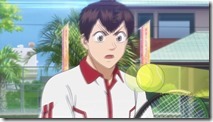 |
 |
 |
 |
 |
As I type this, the clock is ticking down towards what should be one of the best matches men’s tennis has seen in years – Djokovic and Federer in the U.S. Open final. These two have clearly been the best players not just this tournament but this year, and the drama is heightened by the fact that Fed is doing this at the unlikely age of 34, when you simply aren’t supposed to be able to do what he’s doing physically. But he’s been denied that 18th Slam that’s eluded him for three years, and Djokovic is the main reason – Roger was the best player at Wimbledon by a long stretch until that finals rematch with the current best player in the world.
One of the things that makes that matchup so fascinating is the contrast between Federer’s attacking, unpredictable and almost balletic brilliance and Djokovic’s relentless, intellectual perfection. But in Maruo vs. Nabae we’re seeing a matchup that’s epic for a different reason, and that’s because these two players are so very much alike. That doesn’t always yield a compelling match but in this case it does, mostly thanks to the writing of Katsuki Hikaru.
One thing among many I really love about Baby Steps is they way it captures how so much of tennis is a mental game – the war between the ears that usually trumps the one between the lines. Given that’s such a strength of this series it’s no surprise that this match should be among its most compelling, because these are the two most complicated boys in the cast. And not only that, Nabae is virtually Ei-chan’s alter ego – a tantalizing yet taunting goal and target, a reminder of all that’s possible for Ei-chan but also of how far away the goal is. Nabae-kun is in many ways the player Ei-chan longs to become, and a reminder that he hasn’t yet achieved the goal.
There’s a very interesting moment in the episode where we see – via flashback – something we haven’t before, a matchup between Nabae and Ike Souji. Ike is an even more elusive goal for Ei-chan than Nabae, and he represented for Nabae a puzzle he couldn’t solve – a talent that transcended Nabae’s ability to unlock it through analysis and observation. But it was being pummelled by Ike that was the final impetus for Nabae to channel his negative emotions into something he could use as a positive on the court. For players like Nabae and Ei-chan, the game will never be as natural and free as it is for someone like Ike Souji – just as, I suspect, even as he rises to the ultimate heights Djokovic will never understand the way tennis feels to someone like Federer or Sampras.
But the thing is, that hasn’t stopped Djokovic from becoming the dominant player in an era where Federer, Murray and Nadal are still relevant – and I think that’s very much the point. The challenge for Maruo-kun is that Nabae is like a mirror off which all of his strategies are reflected. Maruo does find a way to hold serve one more time and win the first set, but he’s forced to rely on one-off surprise tactics to do it – a quick serve, a second-serve ace, an out-of-context drop shot. That kind of strategy isn’t sustainable over the long haul, because in addition to being outside Maruo’s comfort zone it’s not really a strategy at all, but rather reckless abandonment of strategy in favor of pure surprise. Nabae is simply too smart, too observant and too calm under pressure to be consistently fooled by tactics like that over a full set. And as any military historian can tell you, tactics and strategy are two very different things.
So what’s the answer? That’s the puzzle Ei-chan must try and solve if he wants to storm the barricades, subdue Nabae-kun and level up in a sports series where leveling up really means something. Nabae promptly breaks him in his first service game of the second set, and he seems to be one step ahead of every move Ei-chan makes. “If he sees 10, he goes for 11. If he sees 11, he goes for 12” Ei-chan thinks to himself, and this is the risk-minimizing strategy his opponent has mastered – understand the opponent thoroughly, and risk only as much as necessary to defeat him. That means Ei-chan’s change-of-pace and 1/81 control won’t work – not well enough to win, anyway. And he lacks the raw firepower to win by trying to devolve the match into an out-and-out slugfest.
The only answer Ei-chan can come up with? The Zone – that mystical place he’s visited only four times in his tennis career. I’ve made reference to the way Ei-chan’s psyche is built around trying to quantify the unquantifiable, and he offers his own twist this week – “consciously unconscious”. This is not a riddle Ei-chan is ready to solve yet, but that’s what he’s staring at – how does he do what his coach suggests is possible, consciously will himself into a state that’s inherently reached unconsciously? Trying to unravel that kōan (I don’t use that word by chance, though I won’t go into detail – yet) is clearly the giant baby step that the season to going to build its conclusion around.
 |
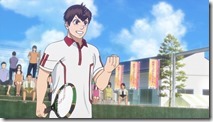 |
 |
 |
 |
 |
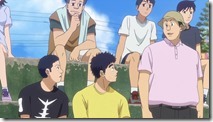 |
 |
 |
 |
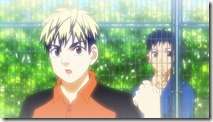 |
 |
 |
 |
 |
 |
 |
 |
 |
 |
 |
 |
 |
 |
 |
 |
 |


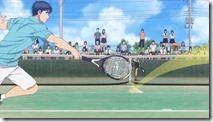
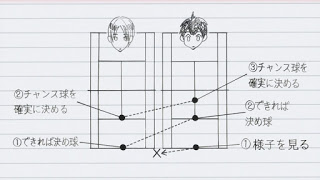
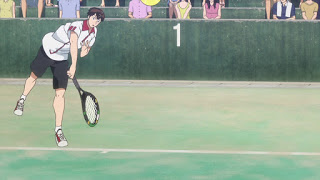
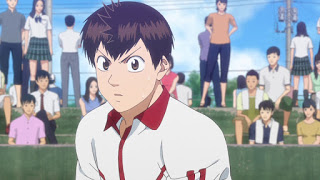
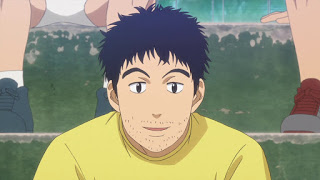
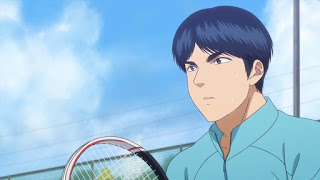
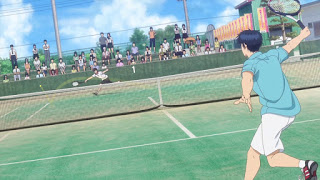
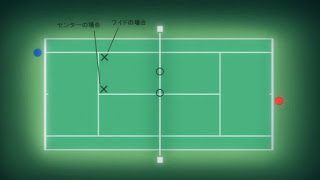

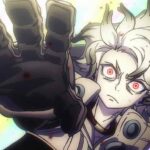
Ulin
September 13, 2015 at 9:11 pmOne episode to go… I don't really remember how it was this in the manga but, do you think it will be an original ending or we could have hopes for a 3d season?
admin
September 13, 2015 at 10:14 pmThings have been so faithful up to now it's hard to believe we'd get an original ending. And I'm not sure how you could craft one in a single episode that would make sense.
I think there's a chance of a 3rd season. It's NHK, and the manga is definitely seeing a bump. But I'm not getting my hopes up.
Jay Psi
September 13, 2015 at 11:19 pmAs I type this the court is being dried, but that's too late for me to watch any of it unfortunately. By the way what am I to make of this minor storm over Federer moving way up on second serves? From my limited knowledge it looks like he's doing nothing more than "chip & charge" that was prevalent a good while back, so why are so many knickers in a twist? Djokovic and Becker not being pleased is easy to understand (why don't you take a medical time-out when Roger does it again Novak, that'll make you feel better…) but I'm really not seeing this supposed insult that so many others in the sport are. It's not as if Maruo felt insulted when Nabae moved way up on his serve.
Speaking of which, this is a typically fascinating encounter, and to my eyes the most cerebral one yet. What do you do when you are faced with someone who does the all same things you do, but does each one of them that much better? Nothing conventional will work because s/he can give more than you can take, and the unconventional will only work for a short time, if it even works in the first place. The talk of "the zone" and "consciously unconscious" reminded me of something I was told for helping with studying, but I think it applies here – focus isn't about concentrating on one thing, it's about not concentrating on anything else. I always thought there was something kind of Zen about that statement, which I suspect you will do a much better job of explaining than me when you expand on that kōan next week.
Katsui Hiraku has done a really good job in making the flow of the game clear inside the heads of the players, even when the points look to tell a different story.
admin
September 14, 2015 at 4:39 amSadly, part of that conversation about kōan can only come if we get a 3rd season (or I give up and blog the manga).
As for the SABR (Sneak Attack By Roger) it's quite a bit more than a chip and charge – he's pretty much standing on the service line when he receives. It's not something he invented, though it's been virtually extinct since before the TV era. As for Boris (who I love, BTW) he's just spouting BS to try and play head games with Roger. And really, head games are what SABR is all about – it's not about winning the point so much as getting into the opponent's head. And if they get that pissy about it that it throws them off, it works.
Couch Tomato
September 14, 2015 at 6:54 amI have a hunch that the zone has to do with Natsu. I know she affected him the last two times he was in the zone, but I can't remember if she was involved earlier.